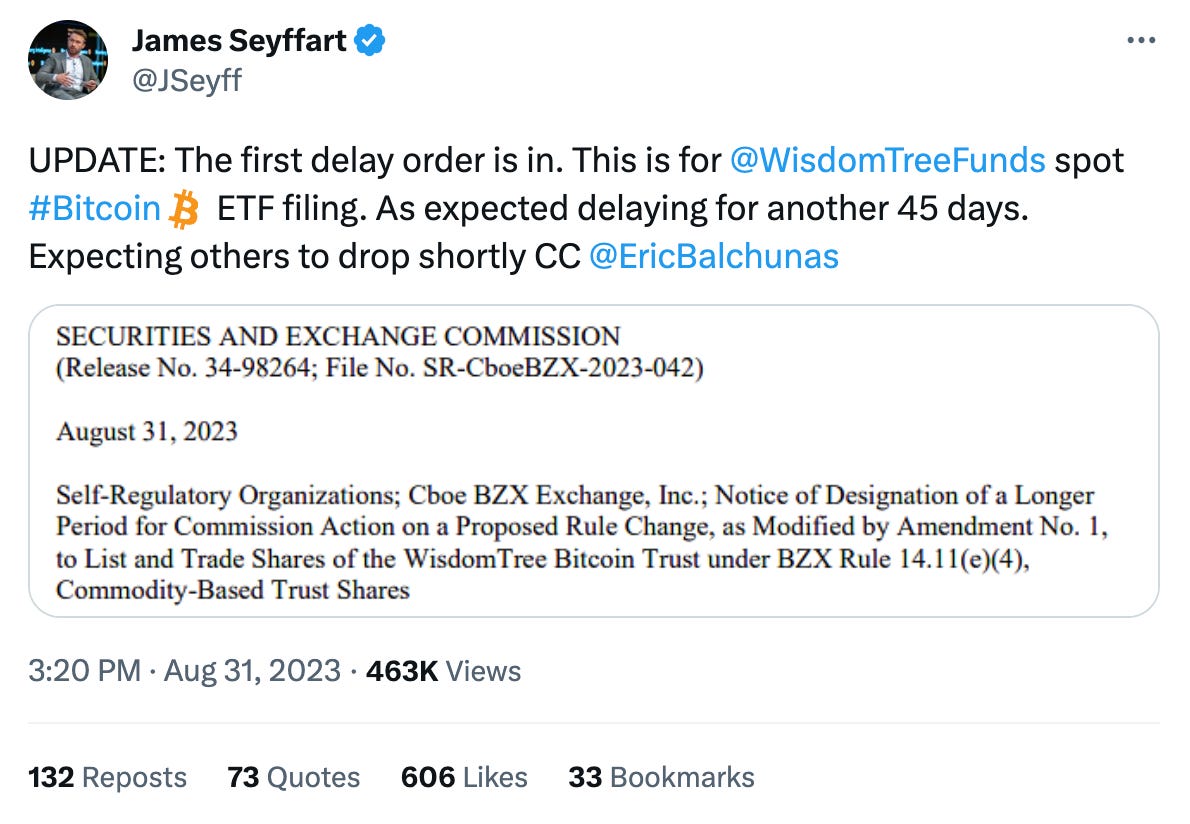
Before diving in today, let’s take a moment to once again appreciate Circuit Judge Neomi Rao’s ruling that the SEC acted in an “arbitrary and capricious” manner when it denied Grayscale’s spot Bitcoin ETF application.
When I wrote about this earlier this week, I mentioned how it’s a big win for Bitcoin enthusiasts. What I failed to mention is that it was also a big win for the judicial system. Without the courts checking the actions of power-hungry authoritarians like SEC Chair Gary Gensler, we’d be further along on our way to despotism here in the US.
So, thank you Judge Rao for your very sensible ruling and for checking the power of an unelected bureaucrat gone wild.
But did we really think said bureaucrat would roll over and approve a spot Bitcoin ETF in the wake of this ruling? Of course we didn’t.
We know that a former Goldman Sachs employee who’s worth about $120 million is the antithesis of someone who acts in the public’s interest.
And so on Thursday the news started rolling in that the SEC would delay the approval of the spot Bitcoin ETF.
According to CNBC, the SEC has 240 days to approve or deny the spot Bitcoin ETF applications, which means it’s first deadline would be January 10, 2024, which would be for the Ark Invest application filed on May 15.
So, we likely won’t see a spot Bitcoin ETF any time soon, and, personally, I think the SEC is delaying for reasons greater than the preservation of Gensler’s fragile ego.
I’d imagine that the institution knows that the US is toward the tail end of a long-term debt cycle and that it knows that the US is going to have to inflate its way out of its debt. It doesn’t want the price of bitcoin to balloon as it does so.
Let me explain further…
Locking the Theater Doors
On the episode of What Bitcoin Did below, seasoned macro analyst Luke Gromen discussed why he thinks the SEC is taking such severe actions against the Bitcoin/crypto industry.
Here’s what Gromen had to say:
“If I was in charge of the US economic policy and they came and they said ‘Luke, we’re going to have inflate 100% a year for two years. We tried to inflate a little and inflation got [to be] a political problem; then, we went the other way, now we’re having these Treasury market problems — we’re going to have to inflate it, BUT we can’t put in capital controls, but we also want to control things in a way so that we don’t look too bad… We don’t want things going up that make us look bad.’
So if the stock market goes up a ton, there’s not going to be any Americans going ‘Oh you guys are terrible, the stock market is up 100% a year for three years.’ People will love that; they won’t ask a lot of questions. If bitcoin goes up 500% a year for three years, or if gold goes up 200% a year for three years, there starts to be more questions.
So, when I think about this framework of they need to inflate away, and by delaying the inflating away as much as they already have, they’re increasing the odds they need to do [it in] a really compressed period. And then I look at Operation Chokepoint 2.0 [and think] ‘Gosh, it sure looks like they’re trying to chain the theater doors before they light the joint on fire.’”
Be Careful Holding the Government’s Broken Money
In her new book Broken Money: Why Our Financial System Is Failing Us and How We Can Make It Better (the best book on money I’ve ever read), Lyn Alden describes a similar scenario.
In the chapter entitled “The Long-Term Debt Cycle”, Alden discusses how this period of deficit-driven inflation resembles that of the 1940s. What’s mind-blowing about this is that we had such high inflation in the 1940s during and after financing our role in World War II. Now, we’re experiencing a similar dynamic due to little more than a few decades of insanely poor monetary and fiscal policy (and in part due to our financing our 20-year failure of an occupation in Afghanistan).
Alden states,
“Annual price inflation reached a peak of 19% in the 1940s and averaged about 6% between the early 1940s and the early 1950s, and yet the Federal Reserve kept interest rates low and expanded the monetary base dramatically to keep buying federal debt at low interest rates to fund the war. Anyone holding cash or bonds was sharply devalued throughout the decade.”
She also discusses how the government wants you to hold cash and bonds during these inflationary periods, because the more you don’t, the greater the inflation gets.
In other words, if you don’t hold cash or bonds, you’re effectively shorting them, which creates more inflation.
(With that said, what Alden doesn’t share in the book is what Gromen does share in the aforementioned interview, which is that people can hedge by owning shares of stocks, which doesn’t make the US government look so bad to the 61% of Americans who own stocks.)
Mauricio Di Bartolomeo, native Venezuelan and co-founder and CSO of the Bitcoin-lending firm Ledn, touched on this dynamic in my interview with him:
What are the SEC’s true intentions?
No one knows for sure, but the institution and the wannabe autocrat that leads it could be doing everything in its power not to allow a spot Bitcoin ETF to come to market because, as Luke Gromen said, the US government doesn’t want to “look too bad”.
If more people can gain exposure to bitcoin’s price via traditional markets, more people then have a way of shorting the dollar and bonds, which the powers that be don’t want as they prepare to make an attempt to inflate away the debt.
You’d think these bureaucrats would feel shame after all the damage the US government and the Fed have done to the currency of the US as well as its bond markets and would do something like approve this spot Bitcoin ETF as means to help everyday Americans hedge against this potential oncoming bout of megainflation. However, it seems that they’re impervious to such shame and will do what they can to keep everyday Americans trapped.
That is, the SEC is the federal institution that is currently on the frontlines trying to stop people from getting out of the theater before the US government lights and throws the match that burns this mother down.
Keep reading with a 7-day free trial
Subscribe to Frank Corva's Newsletter to keep reading this post and get 7 days of free access to the full post archives.





